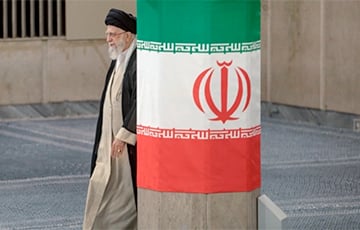Iranian Ayatollahs Are Doing Badly
- Arkady Dubnov
- 23.12.2024, 16:04
- 22,572

It smells like trouble.
Iranian ayatollahs are doing badly, so badly...
I judge this according to yesterday's statement by the main of them, the Supreme Leader of Iran, Ayatollah Khamenei. It looked as funny as it was warlike. “Iran does not have its own proxy forces in the region. Yemen, Hezbollah, Hamas and Islamic Jihad are fighting for their faith and do not receive any support from us," Khamenei suddenly disowned his ideological followers. What did happen?
Nothing special, it just smelled like trouble, the Western coalition led by the United States, the UK and with the participation of Israel finally began a systematic suppression of the Yemeni Houthis, who have been terrorizing international shipping for a couple of years, committing armed attacks on merchant ships in the Red Sea. The time has come to respond to Tehran, which is arming the Houthis, including with ballistic missiles, one of which was launched at Tel Aviv a couple of days ago.
There has already been a leak in the Israeli media from the course of discussions in the country's leadership, according to which the head of the Mossad, David Barnea, said: "We must hit you in the forehead. – if we attack only the Houthis, it will not help..."
But the 85-year-old Iranian elder is cheerful, the second part of Khamenei's statement sounding desperately threatening: “The brave men of Yemen, Iraq, Lebanon, Palestine and Syria are confronting the Zionist regime. We, too, will continue to fight and destroy this regime.” There is nothing new in this rhetoric, it is important to note at what point the elderly ayatollah once again promised to destroy Israel.
At a time when the Iranian regime is unusually weakened, they say in Washington. President Biden's national security adviser, Jake Sullivan, warned that “Iran, weakened by recent events in the Middle East, may abandon promises not to develop nuclear weapons, we are aware of this risk, we are talking about it with Israel and with representatives of the transition team(Trump),” Sullivan said.
At the same time, he made a kind of compliment to the 47th US president, noting that he noted that Trump's non-standard approach to international relations and his tendency to "unpredictable actions" can be used to promote US national interests. Especially against the backdrop of “the weakening of such strategic adversaries of the United States as Russia and Iran, which creates opportunities for significant diplomatic success,” Sullivan added.
I would add to this "picture of the day" the extremely cautious behavior of the Kremlin towards a "weakening" Iran. Let me remind you that exactly two months ago, during the BRICS summit in Kazan, the previously announced signing of an agreement on strategic partnership between Russia and Iran did not take place. It was said that the agreement would be signed during a separate visit to Moscow by Iranian President Masoud Pezeshkian, which, they say, would emphasize the significance of this event. The date of the visit was promised to be announced later. But so far they prefer not to remember it in Moscow.
If in October it was logical not to rush with the 'Iranian' agreement, we expected the results of the November presidential elections in the United States, but now even more so – a demonstrative rapprochement between Moscow and Tehran will not benefit Putin's desire to meet with Trump as soon as possible after his inauguration on January 20. Of course, it is too early to say that Iran is ready to "merge" in the Kremlin for the sake of mutual understanding with Washington on the issue of Ukraine, but the logic of events is similar to that...
Arkady Dubnov, Telegram











